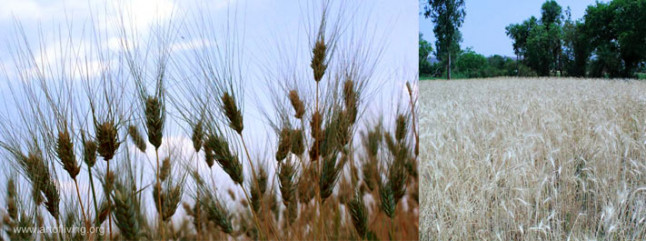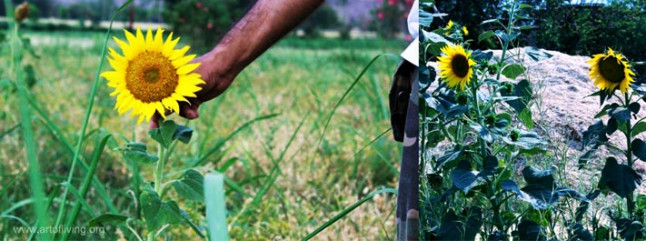A much-hyped issue in India is revolving around food – the modifications in it, the injecting of plants, the organic and the chemically-grown. The perplexing debate around food requires a better understanding of the food we consume and feed our families.
Three years ago, Swadesh Chowdhary, a BSc graduate and a young family-man from the district of Betul in Madhya Pradesh, was an educated farmer. “I had actually spoiled the land with the use of chemicals. I was introduced to natural farming in 2010,” he shared, adding, “Initially I began with two acres on a bad soil patch. And today, I practice natural farming on my entire land of 30 acres.”
Commitment: From paper to field
“Usually chemical companies visit farmers with various products. I, too, decided to experiment using different chemicals. This left me confused, my farm miserable and broke me,” Swadesh states.
Hope came in the form of the Sri Sri Natural Farming program. Swadesh says that the interactive sessions helped to shed his doubts while the experiences shared by other farmers reinforced his trust and faith in natural farming.
While undergoing the Sri Sri Natural Farming program for farmers, Swadesh visited several model farms in Maharashtra. “I was so impressed with the results there. It was so easy and inexpensive. The farmers there shared really heart-touching success stories of natural farming. The visit removed all my doubts,” he says.
Although Swadesh committed to experimenting on two acres, he was reluctant when the fertilizing stage came. When Swadesh was still deciding between the two farming options, he chanced upon some dead squirrels and birds on his land. On closer inspection, he realized that insects and snakes were also dead in the vicinity. The cause was later found: chemicals that Swadesh had sprayed on his sugarcane crop in a bid to reap a rich yield. “This became a defining moment for me. I knew I had to make the switch,” he shares.
Farmers hail natural farming
“In the first year, around 12 quintals was the output of wheat. In the second year, the output was increased by two quintals,” he smiles.
Swadesh is proud of his land and the soft soil. It can be dug easily with hands and one can even find earthworms that are much needed for soil.
“In my experience, it is a big loss to practice chemical farming. Farmers have to understand the damage that chemicals do to the soil, its active bacteria, the health of the crops and the environment,” shrugs Swadesh.
The expense for one acre in natural farming is not more than Rs. 300*. With the usage of chemicals, the cost can escalate to Rs 2000 per acre. Swadesh adds that it is because the manure and the fertilizers are all created by the resources available at home. Also due to the “concept of intercropping*, I gain twice the investment.”
Positive results and a positive attitude have helped Swadesh to go on, despite problems every once in a way. “I practice the Sudarshan Kriya, and help other farmers make the switch,” he says, adding, “Only naturally grown food and natural farming is conducive to nurturing humanity in a healthier way.”
300 - The cost is a minimum of Rs.300 and can go up to a maximum of Rs. 500 only.
Inter-cropping - In farming, some plants need nitrogen from the atmosphere while some plants release nitrogen. Farmers grow this combination.
Story credit: Monica Patel
Published on: August 29, 2013




